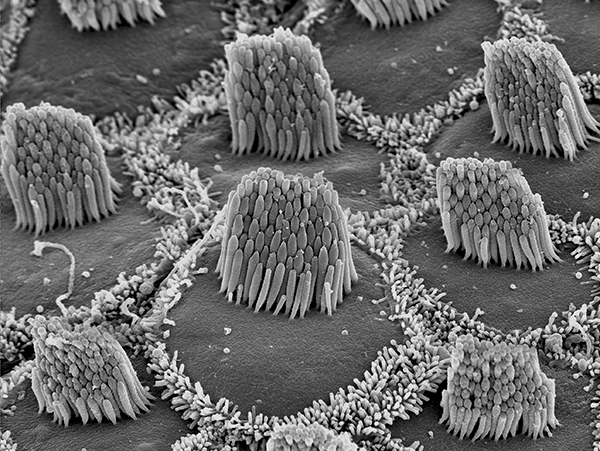현재 위치:홈 > 뉴스현황 > Press Events > Protein Essential fo...
저자: 업로드:2017-07-03 조회수:
Although the basic outlines of human hearing have been known for years, sensory cells in the inner ear turn sound waves into the electrical signals that the brain understands as sound, the molecular details have remained elusive.
Nearly 40 million Americans suffer from some level of hearing loss, which includes approximately 74,000 children with profound, early-onset deafness, with almost 50% of these cases stemming from genetic causes. While the cellular architecture and basic biology surrounding human auditory perception have been understood for quite some time, the underlying molecular mechanisms that mediate the conversion of sound waves into signals that the brain interprets as sound is still unclear.

Now, researchers from the University of Maryland, School of Medicine (UM SOM) have just published results identifying a crucial protein in the auditory translation process. Findings from the new study were published online today in Nature Communications in an article entitled “CIB2 Interacts with TMC1 and TMC2 and Is Essential for Mechanotransduction in Auditory Hair Cells.”
CIB2, or calcium and integrin-binding protein 2, was found previously to be essential for the structure of stereocilia, the structures at the top of the sensory hair cells in the inner ear. Stereocilia are extremely small, less than a half a micrometer in diameter, which is about the wavelength of visible light. Each ear contains 18,000 hair cells that do not divide or regenerate.
UM SOM investigators discovered five years ago that CIB2 was involved in hearing. Since then, they have studied this protein in flies, mice, zebrafish, and humans. The new study is the first to explain the mechanism behind CIB2 in hearing.
In the current study, the research team genetically engineered mice without CIB2, as well as mice in which a human CIB2 gene mutation had been inserted. The researchers found that the human mutation affects the ability of the CIB2 protein to interact with two other proteins, TMC1 and TMC2, which are crucial in the process of converting sound to electrical signals. This process is known as mechanotransduction.
"We are very excited by these results," remarked co-senior study investigator, Zubair Ahmed, Ph.D., professor in the department of otorhinolaryngology head & neck surgery at UM SOM. "This tells us something new about the fundamental biology of how hearing works on a molecular level."